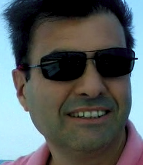Fabio Schifano

Sebastiano Fabio Schifano si è laureato in Informatica presso l'Università di Pisa (Italia). Ha trascorso la sua carriera scientifica prima presso l’istituto IEI-CNR e successivamente presso l'INFN, ed oggi è Professore Associato di Informatica presso l'Università di Ferrara (Italia). Ha avuto un ruolo importante in diversi progetti per lo sviluppo di sistemi paralleli ottimizzati per la simulazione numerica della teoria di Gauge su reticolo (LQCD), la fluidodinamica e gli spin-glass. Nel 2007 è stato coautore del progetto QPACE per sviluppare un sistema massicciamente parallelo basato su processori IBM Cell-BE, interconnessi da una rete mesh 3D custom, premiato come miglior sistema Green500 nel Novembre 2009 e Giugno 2010. Nel 2005 e nel 2010 ha contribuito alla progettazione e allo sviluppo dei sistemi Janus, un array di FPGA per simulazioni di spin-glass. È stato Visiting Researcher presso l’istituto DESY (Berlino, Germania) e il Juelich Supercomputing Centre (Juelich, Germania). Più recentemente, le sue attività di ricerca si concentrano su High Performance Computing, e in particolare sulla progettazione e ottimizzazione di applicazioni per GPUs e CPUs multi-core. È autore di oltre 150 articoli e comunicazioni a convegni.
Sebastiano Fabio Schifano graduated in Computer Science from University of Pisa (Italy). He spent his early scientific career at IEI-CNR and INFN, and now is Associate Professor of Computer Science at University of Ferrara (Italy). He had a major role in several projects for the development of parallel systems optimized for Lattice Gauge Theory, fluid dynamics and spin-glasses. In 2007 he was a co-author of the QPACE project to develop a massively parallel system based on IBM Cell-BE processors, interconnected by a custom 3D-mesh network, awarded as the best Green500 system in Nov '09 and Jun'10. In 2005 and 2010 he contributed to the design and development of the Janus systems, an array of FPGAs for spin-glass simulations. He has been a visiting researcher at DESY (Berlin, Germany) and at the Juelich Supercomputing Centre (Juelich, Germany). More recently, his research activities are focused on High Performance Computing, and in particular on the design and optimization of applications for GPUs and multi-core CPUs. He is the author of 150+ articles and conference papers.
